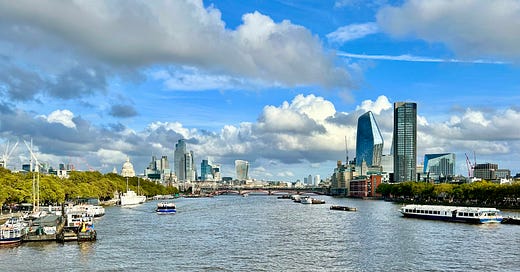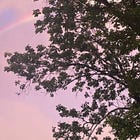Joke's on US
An American comedian in London reappraises her material in the wake of Trump's return to office
Editor’s note:
O/o/N is looking for submissions! Searching for ideas about what to write? Check out our pre-approved pitch list. Example: A cooking essay disguised as a family essay or a family essay disguised as a cooking essay. Also, have you ever wondered how it feels in 2025 to make jokes about America to an audience of non-Americans? Find out below. -AZ
Joke’s on US
By Elizabeth Leff
I have three older brothers. “You must have grown up tough,” people say, assuming I rolled with the punches, name-calling, and other youngest sibling requisites. When we weren’t at home, however, my brothers were my fiercest advocates. Seeing them in the "real world" (the hallways at school) was always a relief. Terrorizing me was their job and their job only. I knew that if anyone else tried to push me around, they wouldn't allow it.
Being an American living in the United Kingdom can feel like being that older sibling.
I've done a lot of cool things since moving a year and a half ago. I’ve traveled to multiple countries, offended people with my bad English accent, and gone to the doctor without fear of bankruptcy. It’s been amazing.
When talking to Brits about my move to London, they inevitably joke, “Did you move here to flee the political landscape of the U.S.?” I respond, “If that was the reason, do you really think I’d choose the UK?” Their keenness to laugh at (not with) Americans for what’s happening back home rubs me the wrong way. When I use humor to cut through the tragedy of our current events, it feels okay, but when they do it, it feels dangerous. Plus, the reason I moved to England is the food.
Don’t worry, it’s not the food.
I’ve moved many times in adulthood. My therapist tells me it’s because I’m highly motivated and have an innate wanderlust. I tell her it’s because I’m incapable of feeling content and as soon as I feel comfortable, I run. We agree to disagree. She’s great, and I pay her a lot of money.
In my many moves, I’ve discovered the best way to make friends and to be in community is to take a comedy class and start performing. As the youngest of four, I’m scientifically the funniest sibling. I’ve always used humor as a tool to express myself and cope. It has also helped me understand my “place” as an American living outside the U.S. I joked before about medical bankruptcy, just one of many issues I make sense of by pointing out its absurdity.
Here’s one from my standup. After I sheepishly acknowledge my nationality, I say:
I moved to London relatively recently, and there are still times when I experience a real language barrier. Like how we have different words and phrases for things. For example, you say trousers, we say pants. You say chips, we say fries. You call it an arms deal, we call it back to school shopping.
This joke is sad and heavy and for some people probably crosses the line, and that’s fair. There are days when I think it crosses a line. But this is the stuff I write jokes about because I believe two things: 1) I, an American and someone who knows personally how destructive guns are, am uniquely situated to make that joke here in the UK and 2) I’m incapable of processing the shittiness of the world without comedy.
Sure, it would be cool if instead of telling jokes on stage about how gender affirming care is only accessible to cis men who are balding or can’t maintain an erection, I could tell jokes about, I don’t know, anything else. But I’ve sat down hundreds of times at my computer to write material, and the dark humor keeps coming out. And the darker the joke, the bigger the laughs. Comedy isn’t an accessory as the film and television industry would imply, with comedies lumped into a category with musicals at some award shows and drama often held in higher esteem. Comedy is a necessity. Not only does it allow for a collective cathartic experience, it’s also how we take power away from people who aim to control and subdue us. As an American living in the UK, I can use comedy as a tool to poke holes in the logic of fascists, critique the structures that underpin American society, and give people permission to laugh through (not at) the fuckery.
Like many after the 2024 election, I visited the stages of grief and almost took up residence in denial. I pictured a whole life there. When inauguration day came around, I became violently ill, which felt like a reasonable response. Convinced it was psychosomatic, I didn’t go to the doctor for a week. I was sure the trauma from round one was back to haunt me in the most trite way – stomach issues. I told my therapist and, after a classic quarrel, she told me to go to a medical doctor. I listened because it’s her job to look out for me or whatever. I tested negative for all the big, infamous illnesses and just got better on my own after two weeks of uncontrollable [redacted to comply with Opposite of Nihilism’s journalistic standards].
Recently I’ve felt unable to do comedy. Everything just feels so raw. (See above.) I don’t want to make jokes about gun violence or the systematic stripping away of rights. My therapist tells me there’s no rush to get back into it, and of course I disagree. The only thing worse than me telling these jokes is someone else telling them. I don’t want to gatekeep joking about the U.S.; a diversity of opinions means more robust discourse, and I understand that the actions of this government affect everyone. What I am saying is, like an older sibling, if people are going to talk shit about the U.S., I want to be first in line.
Maybe one day I’ll get to stand on stage and tell stories about how we ended poverty or do impressions of our first several woman presidents. But what happens between now and then will be dark, painful, and scary. Comedy is the weapon we’ll wield to cut through it all to avoid the scariest thing to anyone who seeks validation in the laughter of strangers: oblivion.
Elizabeth Leff is an American comedy writer, performer, and filmmaker based in London, UK and a public policy professional formerly based in Washington, DC. She has an MA in Filmmaking and is completing an MSc in Global Health, Social Justice and Public Policy. linktr.ee/leffingoutloud
Coming soon
Next week:
Editor’s notes on Passover
Later next month:
Notes on the meaning of home from a writer who lost her house, but not her picket fence, in the Pacific Palisades
One millennial grapples with truth and belief in the post-enlightenment age
To-do list
Forward this newsletter! Help grow our audience and build a community for which contributors are excited to write.
If you’re not already, please subscribe to Opposite of Nihilism! Publishing weekly on Sundays.
Submit to be published, or encourage a writer you know to do the same! Read our submission guidelines here.








